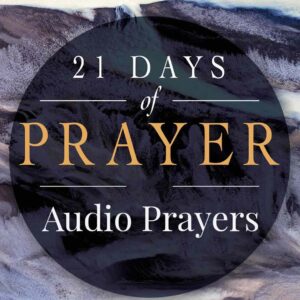How the Spirit Ignites Our Supplication
A few years ago, my wife and I spoke at a women’s gathering on a Saturday morning. After the breakfast, a mother and daughter from our church gave the first presentation. We were slated to follow them on the program. Their story was riveting.
Linda Barrick and her daughter, Jen, gave an account of the events that took place on a Sunday evening, November 5, 2006. As the family drove home from church, a drunk driver traveling 80 miles per hour struck their minivan head-on. The father, Andy, and Linda were in the front. Fifteen-year-old Jen and eleven-year-old Josh were in the back. All sustained life-threatening injuries. They were rushed to emergency rooms at different hospitals.
While all four family members were in serious condition, doctors did not expect Jen to live through the night. But God sustained her life. She remained in a coma for five weeks with traumatic brain injuries and multiple skull fractures. Jen’s slow emergence from the coma took many more weeks. Doctors feared the brain injuries might prompt a flurry of strange behaviors such as screaming or cursing. Instead, Jen’s spirit poured out with praise songs and constant prayers. Even though she was not cognizant of her injuries, her location, or even the names of her family members, she continued to praise God. Her mom commented, “The Holy Spirit was so alive and evident in her.”
Unable to open her eyes or comprehend her surroundings, Linda says her daughter literally prayed for hours. “But she did not ask for one thing,” recounts Linda. “Even with her body thrashing back and forth uncontrollably, she would cry out for hours, ‘Lord, you are so good. Lord, you are so faithful.’” Linda notes, “I would just sit there and weep as the Spirit enabled her to praise her Father, sing worship songs, and even quote Scriptures. It was as if she had been in His presence the whole time.”1
The Holy Spirit’s Produce
Today, Jen is still in the recovery process, suffers memory loss, and endures cortical blindness. Yet she is able and eager to join her mother regularly in telling this amazing account of God’s grace and the power of prayer. As Rosemary and I listened to the Barricks’ story, we were struck by this truth: The Holy Spirit produces truth-based worship and thanksgiving in the hearts of His children.
The Holy Spirit produces truth-based worship and thanksgiving in the hearts of His children.
Beyond our mental and physical capacities exists a spiritual dimension that we must grasp if we are going to learn to pray by the power of the Holy Spirit. Worship-based prayer brings our hearts into intimate harmony with the person of the Holy Spirit and enhances our surrender to His control, wisdom, and power for our prayers. The Spirit then enables us to worship more fully. This worship, in turn, brings us into a deeper reality of the Spirit’s life, thus continuing the circle.
Worship-based prayer brings our hearts into intimate harmony with the person of the Holy Spirit and enhances our surrender to His control, wisdom, and power for our prayers.
Jen Barrick, with limited mental and physical capacity, exhibited a profound experience of prayer in the realm of the Holy Spirit. Many of us depend on our own intellect and forget the Holy Spirit’s essential role. We may punch the prayer clock, but transformation eludes us.
Many of us depend on our own intellect and forget the Holy Spirit’s essential role. We may punch the prayer clock, but transformation eludes us.
Graveyard or Insane Asylum
My friend Jim Cymbala urges Christians toward a vibrant and practical reliance on the Holy Spirit. He strongly notes that when it comes to the person of the Holy Spirit, churches tend to be either cemeteries or insane asylums. Some hardly recognize the Holy Spirit or seek Him at all. Others engage in all kinds of bizarre, extra-biblical antics, for which the Holy Spirit gets “credit.” In our prayers, we want to avoid these extremes, but must set our hearts on the very real, powerful, and practical reality of the Holy Spirit.
Living and Praying in the Spirit
In his book Forgotten God, Francis Chan writes, “From my perspective, the Holy Spirit is tragically neglected and, for all practical purposes, forgotten. While no evangelical would deny His existence, I’m willing to bet there are millions of churchgoers across America who cannot confidently say they have experienced His presence or action in their lives over the past year. And many of them do not believe they can.”2
He continues, “If I were Satan and my ultimate goal was to thwart God’s kingdom and purposes, one of my main strategies would be to get churchgoers to ignore the Holy Spirit . . . but when believers live in the power of the Spirit, the evidence in their lives is supernatural. The church cannot help but be different, and the world cannot help but notice.”3
Jesus wants His house (people) to be characterized by prayer (Mark 11:17). The Lord wants us to be controlled and empowered by the supernatural reality of His Holy Spirit rather than by human strategies and intellectual prowess.
The Lord wants us to be controlled and empowered by the supernatural reality of His Holy Spirit rather than by human strategies and intellectual prowess.
J. Oswald Sanders wrote, “Prayer in the Spirit is prayer whose supreme object is the glory of God, and only in a secondary sense is it a blessing for ourselves or for others.”4We experience transforming prayer. This, I believe, is what Jen Barrick experienced during her slow recovery in a hospital bed. And it is what God desires for us in our prayer lives.
(This devotional is adapted from the book Transforming Prayer – How Everything Changes When You Seek God’s Face. CLICK HERE for more information.)
Copyright © 2018 Daniel Henderson. All rights reserved.
——————————————————
- For information about the Barricks’ story, including testimonies, videos, and booking details, visit www.hopeoutloud.com.
- Francis Chan, Forgotten God (Colorado Springs: David C. Cook, 2009), 15.
- Ibid., 16.
- J. Oswald Sanders, Prayer Power Unlimited (Chicago: Moody Press, 1977), 62.



